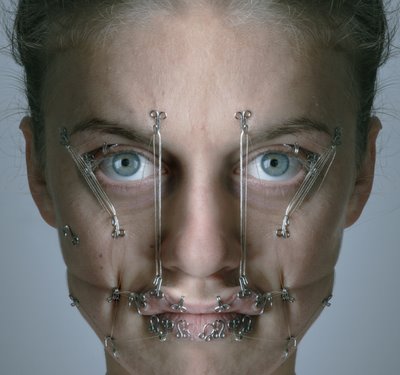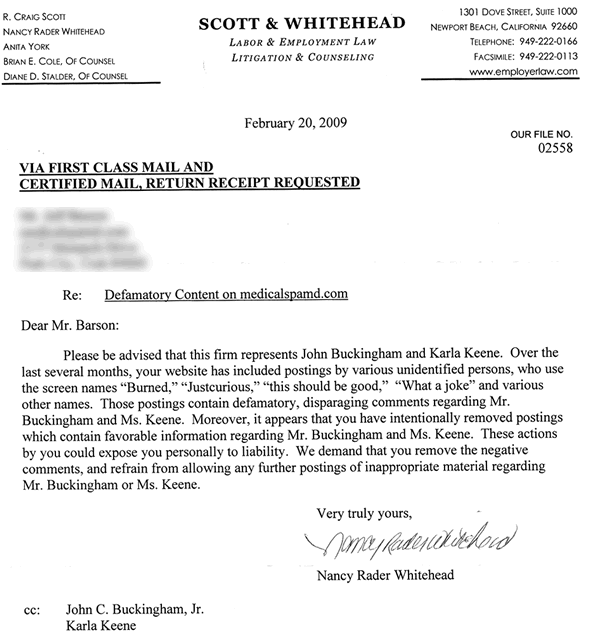It appears that Dermacare has thrown in the towell regarding it reputation.
I received this email from Dermacare and it's CEO Carl Mudd regarding a suit that Dermacare has filed. Since this is the first contact I've ever had with Dermacare, I'm a little surprised. It makes me wonder what's been going on on that Dermacare thread that has 700 comments.
Rather than engage in a back and forth or aim for clarity, which is what I would have recommended, or complaining to me that some of the remarks have crossed a line, (I have actually taken down many comments if they contain profanity directed at any specific individual.), Dermacare and it's CEO Carl Mudd have actually gone and filed suit. (I also received a PDF of the suit naming multiple John and Jane Does.)
Here's the email:
VIA E-MAIL AND U.S. MAIL
Jeff Barson
(I've removed my address here)
Re: DLC Dermacare, LLC v. John and Jane Does – CV2008-090071
Dear Mr. Barson:
My office represents DLC Dermacare, LLC (“Dermacare”) and its CEO Carl Mudd. I am writing in regards to the blog that you host located at www.medicalspamd.com . As you know, you have allowed numerous persons to post information related Dermacare and about Mr. Mudd personally on your site. The information posted is overwhelming incorrect and has served as a discussion board for Dermacare franchisees to not only discourage potential franchisees from partnering with Dermacare but to also promote the breaching of current franchisee agreements held by many of the bloggers on your site.
The comments that you have allowed to be posted on your site have evolved from mere discussions/complaints into actionable claims against the bloggers and possibly even you personally. Pursuant to our filing the above referenced complaint we are now seeking the Internet Protocol (IP) address and the Internet Service Provider (ISP) for each of the following bloggers on your site:
- Dermadoc
- Mr. Bob
- Just Another Ex
- Passive Conduit
- Pm
- Jennifer D
- Pengy
- Mr. Freeze
- Bastard Son of Dermadoc
- GH
- Maxwell Smart
- The Clinician
- The Real M. Smart
- John Galt
- George
- Max
- XYZAL
- Christmas
- Maxwell’s Silver Hammer
- The Passive Conduit
- The Riddler & The Joker
- DoubleDermadare You
- Mad Max
- Manic Max
- Mad as Hell in Dermacare Hell
- A current Franchisee
- FreeTheDerm@ yahoo.com
- WPS
- Insider
- Thomas Jefferson, Jr
- TF
- T. Jefferson, Jr.
- The Joker
- Curious
- Mr. X
Please provide the IP address and ISP for each of the above names no later than Friday, January 18th, 2008. Should you not provide the requested IP addresses and ISP by this date I will be forced to have you served with a subpoena to obtain this information. I have included a copy of the lawsuit that was filed in this matter for your files. If you have comments or questions please direct them to my office.
Sincerely,
John N. Skiba
One North Macdonald Road, Suite 201
Mesa, Arizona 85201
Tel. 480.361.5643
Fax 480.704.3071
www.skibalaw.com
I wasn't asked to keep any of this confidential so here it is.
So what's Dermacare and Carl Mudd doing?
This is what is know as a CyberSLAPP suite. Basically it's a way of intimidating critics by threatening to find out their identity and hit them with some kind of suit. (read below)
You'll notice that Dermacare and Carl Mudd are demanding that I turn over everyones ISP. For those of you who are not that technically savvy, ISP = Internet Service Provider, which I have absolutely no way of knowing anyway as far as I can tell. The IP address is different. That's a unique identifier and could be used to find out who someone is.
These kinds of suits have become increasingly common as a way of combating free speech on the internet. It used to be that if someone said something unkind, it didn't matter that much since only a few people would hear about it. The net changed all of that and now someone who's unhappy with you or your business can be found by everyone so those whe illicit a lot of negative comments tend to have a rougher go of it.
My guess is that this is intended to intimidate those who may comment in a negative way about Dermacare or Mr. Mudd, and to find out who everyone is. While anonymous speech is protected by the constitution, its still unnerving to have someone you've been talking about know exactly who you are, especially if you're in some kind of business relationship. By filing a real suit against 'everyone' in the form of John and Jane Does, it allows him to issue a legal subpoena to get information. (It's basically a cynical way of using the courts which is why some states like California have laws specifically against this.)
Here are some links about these kinds of CyberSlapp suits and where the law comes down on free speech and other issues around this:
Chilling Effects Clearinghouse: A joint project of the Electronic Frontier Foundation and Harvard, Stanford, Berkeley, University of San Francisco, University of Maine, George Washington School of Law, and Santa Clara University School of Law clinics.
Do you know your online rights? Have you received a letter asking you to remove information from a Web site or to stop engaging in an activity? Are you concerned about liability for information that someone else posted to your online forum? If so, this site is for you.
Defamation
The law of defamation balances two important, and sometimes competing, rights: the right to engage in free speech and the right to be free from untrue attacks on reputation. In practice, the filing or even the threat to file a lawsuit for defamation has sometimes been used as a tool to shut down legitimate comments on the Internet.
John Doe Anonymity
Do you post to a public message boards or discussion areas on websites such as Yahoo, AOL or Raging Bull? Do you use a pseudonym, fake name or a "handle"? Has someone asked the host of the discussion or your ISP to turn over information about you or your identity? If so, then the John Doe/Anonymity section may answer some of your questions.
Topic maintained by Stanford Center for Internet & Society
Protest, Parody and Criticism Sites
The Internet, which offers inexpensive access to a worldwide audience, provides an unparalleled opportunity for individuals to criticize, protest and parody.
The following is long but you'll come away with a much better understanding of what this all means:
About Defamation:
Question: What are the elements of a defamation claim?
Answer: The party making a defamation claim (plaintiff) must ordinarily prove four elements:
- a publication to one other than the person defamed;
- a false statement of fact;
- that is understood as
a. being of and concerning the plaintiff; and
b. tending to harm the reputation of plaintiff.
- If the plaintiff is a public figure, he or she must also prove actual malice.
Question: What defenses may be available to someone who is sued for defamation?
Answer: There are ordinarily 6 possible defenses available to a defendant who is sued for libel (published defamatory communication.)
1. Truth. This is a complete defense, but may be difficult to prove.
2. Fair comment on a matter of public interest. This defense applies to "opinion" only, as compared to a statement of fact. The defendant usually needs to prove that the opinion is honestly held and the comments were not motivated by actual "malice." ( Malice means knowledge of falsity or reckless disregard for the truth of falsity of the defamatory statement.)
3. Privilege. The privilege may be absolute or qualified. Privilege generally exists where the speaker or writer has a duty to communicate to a specific person or persons on a given occasion. In some cases the privilege is qualified and may be lost if the publication is unnecessarily wide or made with malice.
4. Consent. This is rarely available, as plaintiffs will not ordinarily agree to the publication of statements that they find offensive.
5. Innocent dissemination. In some cases a party who has no knowledge of the content of a defamatory statement may use this defense. For example, a mailman who delivers a sealed envelope containing a defamatory statement, is not legally liable for any damages that come about from the statement.
6. Plaintiff's poor reputation. Defendant can mitigate (lessen) damages for a defamatory statement by proving that the plaintiff did not have a good reputation to begin with. Defendant ordinarily can prove plaintiff's poor reputation by calling witnesses with knowledge of the plaintiff's prior reputation relating to the defamatory content.
Question: Can an opinion be defamatory?
Answer: No — but merely labeling a statement as your "opinion" does not make it so. Courts look at whether a reasonable reader or listener could understand the statement as asserting a statement of verifiable fact. (A verifiable fact is one capable of being proven true or false.) This is determined in light of the context of the statement. A few courts have said that statements made in the context of an Internet bulletin board or chat room are highly likely to be opinions or hyperbole, but they do look at the remark in context to see if it's likely to be seen as a true, even if controversial, opinion ("I really hate George Lucas' new movie") rather than an assertion of fact dressed up as an opinion ("It's my opinion that Trinity is the hacker who broke into the IRS database").
Question: Is there a difference between reporting on public and private figures?
Answer: Yes. A private figure claiming defamation — your neighbor, your roommate, the guy who walks his dog by your favorite coffee shop — only has to prove you acted negligently, which is to say that a "reasonable person" would not have published the defamatory statement.
A public figure must show "actual malice" — that you published with either knowledge of falsity or in reckless disregard for the truth. This is a difficult standard for a plaintiff to meet.
Question: Who is a public figure?
Answer: A public figure is someone who has actively sought, in a given matter of public interest, to influence the resolution of the matter. In addition to the obvious public figures — a government employee, a senator, a presidential candidate — someone may be a limited-purpose public figure. A limited-purpose public figure is one who (a) voluntarily participates in a discussion about a public controversy, and (b) has access to the media to get his or her own view across. One can also be an involuntary limited-purpose public figure — for example, an air traffic controller on duty at time of fatal crash was held to be an involuntary, limited-purpose public figure, due to his role in a major public occurrence.
Examples of public figures:
- A former city attorney and an attorney for a corporation organized to recall members of city counsel
- A psychologist who conducted "nude marathon" group therapy
- A land developer seeking public approval for housing near a toxic chemical plant
- Members of an activist group who spoke with reporters at public events
Corporations are not always public figures. They are judged by the same standards as individuals.
Question: May someone other than the person who originally made the defamatory statement be legally liable in defamation?
Answer: One who "publishes" a defamatory statement may be liable. However, 47 U.S.C. sec. 230 says that online service providers are not publishers of content posted by their users. Section 230 gives most ISPs and message board hosts the discretion to keep postings or delete them, whichever they prefer, in response to claims by others that a posting is defamatory or libelous. Most ISPs and message board hosts also post terms of service that give them the right to delete or not delete messages as they see fit and such terms have generally been held to be enforceable under law.
Question: Can an ISP or the host of the message board or chat room be held liable for
defamatory of libelous statements made by others on the message board?
Answer: Not in the United States. Under 47 U.S.C. sec. 230(c)(1) (CDA Sec. 230): "No provider or user of an interactive computer service shall be treated as the publisher or speaker of any information provided by another information content provider." This provision has been uniformly interpreted by the Courts to provide complete protection against defamation or libel claims made against an ISP, message board or chat room where the statements are made by third parties. Note that this immunity does not extend to claims made under intellectual property laws.
Question: Must an ISP or message board host delete postings that someone tells him/her are defamatory? Can the ISP or message board delete postings in response to a request from a third party?
Answer: 47 U.S.C. sec. 230 gives most ISPs and message board hosts the discretion to keep postings or delete them, whichever they prefer, in response to claims by others that a posting is defamatory or libelous. Most ISPs and message board hosts also post terms of service that give them the right to delete or not delete messages as they see fit and such terms have generally been held to be enforceable under law.
About John Doe Anonymity
Question: How is Internet anonymity affected by John Doe lawsuits?
Answer: Often called "CyberSLAPP" suits, these lawsuits typically involve a person who has posted anonymous criticisms of a corporation or public figure on the Internet. The target of the criticism then files a lawsuit so they can issue a subpoena to the Web site or Internet Service Provider (ISP) involved and thereby discover the identity of their anonymous critic. The concern is that this discovery of their identity will intimidate or silence online speakers even though they were engaging in protected expression under the First Amendment.
Question: Why is anonymous speech important?
Answer: There are a wide variety of reasons why people choose to speak anonymously. Many use anonymity to make criticisms that are difficult to state openly - to their boss, for example, or the principal of their children's school. The Internet has become a place where persons who might otherwise be stigmatized or embarrassed can gather and share information and support - victims of violence, cancer patients, AIDS sufferers, child abuse and spousal abuse survivors, for example. They use newsgroups, Web sites, chat rooms, message boards, and other services to share sensitive and personal information anonymously without fear of embarrassment or harm. Some police departments run phone services that allow anonymous reporting of crimes; it is only a matter of time before such services are available on the Internet. Anonymity also allows "whistleblowers" reporting on government or company abuses to bring important safety issues to light without fear of stigma or retaliation. And human rights workers and citizens of repressive regimes around the world who want to share information or just tell their stories frequently depend on staying anonymous – sometimes for their very lives.
Question: Is anonymous speech a right?
Answer: Yes. Anonymous speech is presumptively protected by the First Amendment to the Constitution. Anonymous pamphleteering played an important role for the Founding Fathers, including James Madison, Alexander Hamilton, and John Jay, whose Federalist Papers were first published anonymously.
And the Supreme Court has consistently backed up that tradition. The key U.S. Supreme Court case is McIntyre v. Ohio Elections Commission. http://www.eff.org/Legal/Cases/mcintyre_v_ohio.decision
Question: How do CyberSLAPP plaintiffs discover the identity of anonymous Internet critics?
Answer: CyberSLAPP plaintiffs usually get the personal information you gave an ISP or online message board when you signed up (name, address, telephone number, etc.). Some web sites that host discussion boards might only have your e-mail address, in which case a second subpoeana to the ISP that hosts that address will reveal your identity. In many cases, even more detailed information about your use of the Internet can be obtained; it's important to realize that when you go online, you leave electronic footprints almost everywhere you go. (With advanced knowledge of the Internet, however, there are ways to cover your tracks.)
Question: Don't judges review subpoenas before they are sent to ISPs?
Answer: No. The issuing of civil subpoenas is not monitored by the court handling the case. Under the normal rules of discovery in civil lawsuits, parties to a suit can simply send a subpoena to anyone they believe has information that could be useful. That information doesn't even have to be relevant to the lawsuit, as long as it could possibly lead to the discovery of relevant information. The only way that a court will evaluate an identity-seeking subpena is if either the ISP or the target of the subpoena files a motion asking the judge to block the subpoena. Unfortunately, in practice that rarely happens. That is because these subpoenas usually have a short, roughly 7-day deadline, and because many people never even find out that their Internet data has been subpoenaed.
Question: Isn't my ISP required by law to tell me if someone asks for my Internet-usage records and identity?
Answer: Unfortunately, in practice CyberSLAPP subpenas are rarely challenged becaue ISPs often fail to notify the individual who's personal information is sought. Even when they do, the short deadline (often as little as 7 days) does not provide enough time for the speaker to find and hire an attorney and the attorney to prepare the Constitutional arguments necessary to defend against the subpena.
Question: What is a "motion to quash" a subpoena?
Answer: This is a formal request for a court to rule that your information should not be given to the requesting party. This normally includes the request, plus a legal brief (sometimes called a memorandum of points and authorities) explaining why, by law, your information should not be turned over. Samples of briefs filed in John Doe cases are available at:
EFF Archive, Cullens v. Doe, http://www.eff.org/Privacy/Anonymity/Cullens_v_Doe/
http://www.citizen.org/litigation/briefs/IntFreeSpch/articles.cfm?ID=5801
Question: What should I do if I receive notice that my ISP has received a subpoena for my data?
Answer: First you should decide whether you wish to fight to protect your identity, Internet usage records, or whatever else is being sought. You might want to ask your ISP for a copy of the subpoena if they haven't already provided one. If you decide to fight it, you should inform the ISP immediately, and you may want to request that they delay compliance to give you time to find a lawyer. Then find a lawyer, who will file a motion to have the subpoena thrown out. (If your lawyer can later prove that the lawsuit was frivolous, you may be able to recover legal fees if your state has passed an anti-SLAPP statute.)
Question: What are the typical claims behind a CyberSLAPP suit?
Answer: The most common complaints by CyberSLAPP plaintiffs are defamation, trademark or copyright infringement, and breach of contract. Speech that involves a public figure - such as a corporation - is only defamatory if it is false and said with "actual malice." It also must be factual rather than an expression of opinion. In the US, because of our strong free speech protections, it is almost impossible to prove defamation against a public figure. Trademark and copyright complaints typically claim that defendants have violated intellectual property rights by using the name of a corporation or its products, or by quoting from some of their copyrighted materials such as an annual report. In reality, the First Amendment includes a clear right to criticize and discuss corporations and their products, and the law includes clear exceptions for the "fair use" of protected material for those purposes. Breach of contract suits often involve a claim that anonymous speakers might be employees who have violated a contract by releasing confidential information. Of course, the right to anonymous speech is meaningless if a corporation can unmask your identity at will because you might be an employee breaking a promise of confidentiality.
Question: How do judges decide whether to let a subpoena go forward?
Answer: This is a very new area of the law, and there are few well-established principles. The courts do have a duty to balance the right of anonymity against the need to prevent true defamation. So far there have been both good and bad rulings from judges; fortunately several have ruled that the plaintiff must prove that his case has at least a theoretical chance of prevailing before anonymity can be stripped away. Other cases have established a set of key factors to be used in judging anonymity-stripping subpoenas. In most of these the key factors are 1) that the party seeking the subpoena provide evidence that the identity is needed; 2) that the identity is directly needed for a key element in the case; 3) and that the identity information is not otherwise available to the party seeking it. While not yet firmly entranched in the law, these common-sense principles are clearly the right way to ensure that First Amendment rights are protected while still allowing identity to be revealed when there is a genuine need to do so.
Question: What are some of the important cases in this area of law?
Answer: Important CyberSLAPP cases include Dendrite v. Does, http://www.citizen.org/documents/dendriteappeal.pdf,
Melvin v. Doe, http://legal.web.aol.com/decisions/dlpriv/melvinop.html,
Doe v 2TheMart.com, http://www.eff.org/Cases/2TheMart_case/20010427_2themart_order.html,
Global Telemedia International v. Doe, http://www.casp.net/busted.html. Additional information about these and other cases can be found by searching the Internet or looking on the Web sites listed below.
Question: Can I do anything to help change this situation?
Answer: You can do several things. Be educated about your rights. Find out your ISP's policy on the handling of subpoenas, and encourage them - and any Web sites you frequent - to adopt good policies, especially a pledge to notify you of any subpoena before any private information is disclosed. Encourage your state legislators to pass legislation requiring such notice, and press them to amend state anti-SLAPP statutes to explicitly include Internet anonymity cases.
Question: What other resources are available?
Answer: Web sites dealing with this issue include:
www.aclu.org,
www.citizen.org,
www.eff.org,
www.epic.org,
www.johndoes.org,
www.casp.net,
www.cybersecuritieslaw.com,
cyber.findlaw.com/expression/censorship.html
Question: Can someone ask for my identity even if I am not the Defendant in the case?
Answer: Yes. The rules of civil discovery allow a party to a lawsuit (the plaintiff or defendant) to ask anyone for any information that may lead to the discovery of relevant evidence to their case. However, your ability to quash such a request if you are not named as a party to the lawsuit is the same as if you are named. You can still file a motion to quash. Below is a link to the case files for such a case:
http://www.eff.org/Cases/2TheMart_case/
Question: I am in California. Do I have a right to both resist such a subpena and to ask a court to throw out the case, right away, and award me attorneys fees?
Answer: Yes. California has a specific statute, called the anti-SLAPP statute, that allows an early motion to be brought to have a case dismissed if it is aimed at silencing protected expression and participation in matters of public concern.
Code of Civil Procedure § 425.16(b)(1) provides:
A cause of action against a person arising from any act of that person in furtherance of the person’s right of petition or free speech under the United States or California Constitution in connection with a public issue shall be subject to a special motion to strike, unless the court determines that the plaintiff has established that there is a probability that the plaintiff will prevail on the claim.
A legal brief explaining the California statute further in a case involving claims of online defamation is available at:
http://www.eff.org/Legal/Cases/Kesler_v_Doe/
Question: What are the key federal decisions involving anonymous speech?
Answer: 1. Buckley v. American Constitutional Law Foundation (1999) 525 U.S. 182, 197-200;
2. McIntyre v. Ohio Elections Commission (1995) 514 U.S. 334. In that case, on page 357, the Supreme Court said:
"[A]n author is generally free to decide whether or not to disclose his or her true identity. The decision in favor of anonymity may be motivated by fear of economic or official retaliation, by concern about social ostracism, or merely by a desire to preserve as much of one’s privacy as possible. Whatever the motivation may be, . . . the interest in having anonymous works enter the marketplace of ideas unquestionably outweighs any public interest in requiring disclosure as a condition of entry. Accordingly, an author’s decision to remain anonymous, like other decisions concerning omissions or additions to the content Amendment.
* * *
Under our Constitution, anonymous pamphleteering is not a pernicious, fraudulent practice, but an honorable tradition of advocacy and dissent.
3. Talley v. California (1960) 362 U.S. 60. (holding unconstitutional a state ordinance prohibiting the distribution of anonymous handbills)
4. Lamont v. Postmaster General (1965) 381 U.S. 301, 307 (finding unconstitutional a requirement that recipients of Communist literature notify the post office that they wish to receive it, thereby losing their anonymity);
5. ACLU of Georgia v. Miller (N.D. Ga. 1997) 977 F. Supp. 1228 (striking down a Georgia statute that would have made it a crime for Internet users to “falsely identify” themselves online).
Question: Aren’t people required to explain why they’re subpoenaing my identity and other information?
Answer: Not with the initial request. The reasons for the subpena are only provided if the subpena is challenged, through a motion to quash. In opposing the motion to quash, the person seeking the information must demonstrate, at a minimum, that it is likely to lead to the discovery of information that would be useful in a lawsuit.
Question: I signed a confidentiality/privacy agreement with my ISP that provides that they will not release my information. Doesn’t that protect me?
Answer: No. Most privacy agreements state that information will be turned over in response to legal requests, and a subpena is such a request. Even if the agreement does not say so, a legally issued subpoena overrides such agreements as a matter of public policy. Each ISP has a different policy about notifying users when their information has been subpoenaed, but they cannot simply ignore a subpoena under the law without risking legal santion themselves.
Question: What does "respond" to the subpena mean?
Answer: Usually, it means that the ISP will give the requested information to the requesting person. In some cases, ISPs have resisted requests for information on behalf of their customers, but this is not the norm. Unless specifically told differently by your ISP, you should assume that your ISP will turn over your information as part of its response.
Question: Can an ISP or the host of the message board or chat room be held liable for defamatory of libelous statements made by others on the message board?
Answer: No. Under 47 U.S.C. sec. 230(c)(1): "No provider or user of an interactive computer service shall be treated as the publisher or speaker of any information provided by another information content provider." This provision has been uniformly interpreted by the Courts to provide complete protection
against defamation or libel claims made against an ISP, message board or chat room where the statements are made by third parties. Note that this immunity does not extend to claims made under intellectual property laws.
Question: Can my ISP or the host of a message board be held liable for defamatory statements I make on the grounds that they are a "publisher" or "republisher" of the information?
Answer: No. Federal law provides: "No provider or user of an interactive computer service shall be treated as the publisher or speaker of any information provided by another information content provider." This has been interpreted to protect hosts of discussions between other people against defamation and libel claims as a "republisher" of the information. Note that this protection does not extend to claims under intellectual property laws.
Question: Must an ISP or message board host delete postings that someone tells him/her are defamatory? Can the ISP or message board delete postings in response to a request from a third party?
Answer: 47 U.S.C. sec. 230 gives most ISPs and message board hosts the discretion to keep postings or delete them, whichever they prefer, in response to claims by others that a posting is defamatory or libelous. Most ISPs and message board hosts also post terms of service that give them the right to delete or not delete messages as they see fit and such terms have generally been held to be enforceable under law.
Question: My ISP tells me it's been asked to turn over my name as part of a lawsuit against hundreds of "John Does" in a faraway state. What can I do?
Answer: You should probably contact a lawyer, and suggest that the lawyer take a look at arguments raised by the EFF, ACLU, and Public Citizen in one of these suits (e.g., http://www.eff.org/IP/P2P/RIAA_v_ThePeople/JohnDoe/20040202_UMG_Amicus_Memo.pdf)
 On January 1st the State of California put into effect the “Donda West Law”.
On January 1st the State of California put into effect the “Donda West Law”. 


















